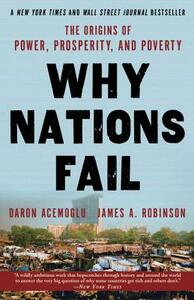Take a photo of a barcode or cover
694 reviews for:
Why Nations Fail: The Origins of Power, Prosperity, and Poverty
Daron Acemoğlu, James A. Robinson
694 reviews for:
Why Nations Fail: The Origins of Power, Prosperity, and Poverty
Daron Acemoğlu, James A. Robinson
I gave up on this about 100 pages in. The authors make their argument in the beginning and then really belabor the point for the rest of the book. Some parts were interesting, but overall it was very dry.
A bit repetitive, but the authors' hypothesis is compelling and well-researched.
informative
reflective
medium-paced
adventurous
informative
informative
slow-paced
informative
medium-paced
Descriptive, not prescriptive (as obvious as the title states). It's a good argument, but with these things it's never one theory over another, but factors from all theories.
I thought I was gonna have a good time. People like it and the subject is right up my alley, so why not? I was wrong, and the thickness of the book is deceptive.
First, I agree that an open political institution is very important for a nation to prosper. But the authors' total disregard of culture and climate is unreasonable.
Second, the book barely expanded on its insultingly simplistic argument of "Inclusion Good, Extraction Bad". It never talked about how nations could become inclusive and technical analysis was nonexistent.
Third, the entire book was just a bloated list of poorly-researched historical anecdotes. If you slash the history part then this book would only have 100 pages.
Overall, a massive time-waster that should only be read in full if you know nothing about history or economics.
First, I agree that an open political institution is very important for a nation to prosper. But the authors' total disregard of culture and climate is unreasonable.
Second, the book barely expanded on its insultingly simplistic argument of "Inclusion Good, Extraction Bad". It never talked about how nations could become inclusive and technical analysis was nonexistent.
Third, the entire book was just a bloated list of poorly-researched historical anecdotes. If you slash the history part then this book would only have 100 pages.
Overall, a massive time-waster that should only be read in full if you know nothing about history or economics.
The premise for this book: inclusive political and economic institutions are successful in the long run. Extractive institutions (politically and economically), will fail in the long run. In addition what is needed is a pluralistic society at the grassroots level which will all but guarantee survival against autocracies (which will fail in the long term).
The authors put on on a path of history that supports their thesis. They also argue that solid foundations in these institutions are bedrocks to success. They predict China will fail in the long term which we now see cracks in. Under Xi, both political and economic institutions are firmly within the grasp of the CCP. Further entrenched is the control of the media which disseminates the news in accordance with the CCP propaganda machine.
The book dispels the theory that geography has nothing to do with a nations success. They argue that the Black Death and international trade between Europe and the rest of the world as examples of nations thriving as a consequence. The pre-1970's China was compared as a nation that turned inwards despite having advanced economies.
I should really rate this a 5* but for the fact that I may not be in full agreement with the thesis although it does give you a compelling argument.
The authors put on on a path of history that supports their thesis. They also argue that solid foundations in these institutions are bedrocks to success. They predict China will fail in the long term which we now see cracks in. Under Xi, both political and economic institutions are firmly within the grasp of the CCP. Further entrenched is the control of the media which disseminates the news in accordance with the CCP propaganda machine.
The book dispels the theory that geography has nothing to do with a nations success. They argue that the Black Death and international trade between Europe and the rest of the world as examples of nations thriving as a consequence. The pre-1970's China was compared as a nation that turned inwards despite having advanced economies.
I should really rate this a 5* but for the fact that I may not be in full agreement with the thesis although it does give you a compelling argument.
Monotonous. I feel the main thing I got out of reading this book was a primer on global revolutionary history. The rest of the thesis could probably fit into a longish New York Times opinion piece.


